"Classification and Transformation of Matter" PPT courseware Simple campus recruitment activity planning plan summary enterprise and institution recruitment publicity lecture PPT template is a general PPT template for business post competition provided by the manuscript PPT, simple campus recruitment activity planning plan summary enterprise and institution recruitment promotion Lecture PPT template, you can edit and modify the text and pictures in the source file by downloading the source file. If you want more exquisite business PPT templates, you can come to grid resource. Doug resource PPT, massive PPT template slide material download, we only make high-quality PPT templates!
| 文件名 如何下载使用 | 下载次数 | Download Points | 下载地址 |
|---|---|---|---|
| "Classification and Tran... | 9425次 | 0.00 | Free Download |
Tips: If you open the template and feel that it is not suitable for all your needs, you can search for related content "Classification and Transformation of Matter" PPT courseware is enough.
How to use the Windows system template
Directly decompress the file and use it with office or wps
How to use the Mac system template
Directly decompress the file and use it Office or wps can be used
Related reading
For more detailed PPT-related tutorials and font tutorials, you can view: Click to see
How to create a high-quality technological sense PPT? 4 ways to share the bottom of the box
Notice
Do not download in WeChat, Zhihu, QQ, built-in browsers, please use mobile browsers to download! If you are a mobile phone user, please download it on your computer!
1. The manuscript PPT is only for study and reference, please delete it 24 hours after downloading.
2. If the resource involves your legitimate rights and interests, delete it immediately.
3. Contact information: service@daogebangong.com
"Classification and Transformation of Matter" PPT courseware, due to usage restrictions, it is only for personal study and reference use. For commercial use, please go to the relevant official website for authorization.
(Personal non-commercial use refers to the use of this font to complete the display of personal works, including but not limited to the design of personal papers, resumes, etc.)
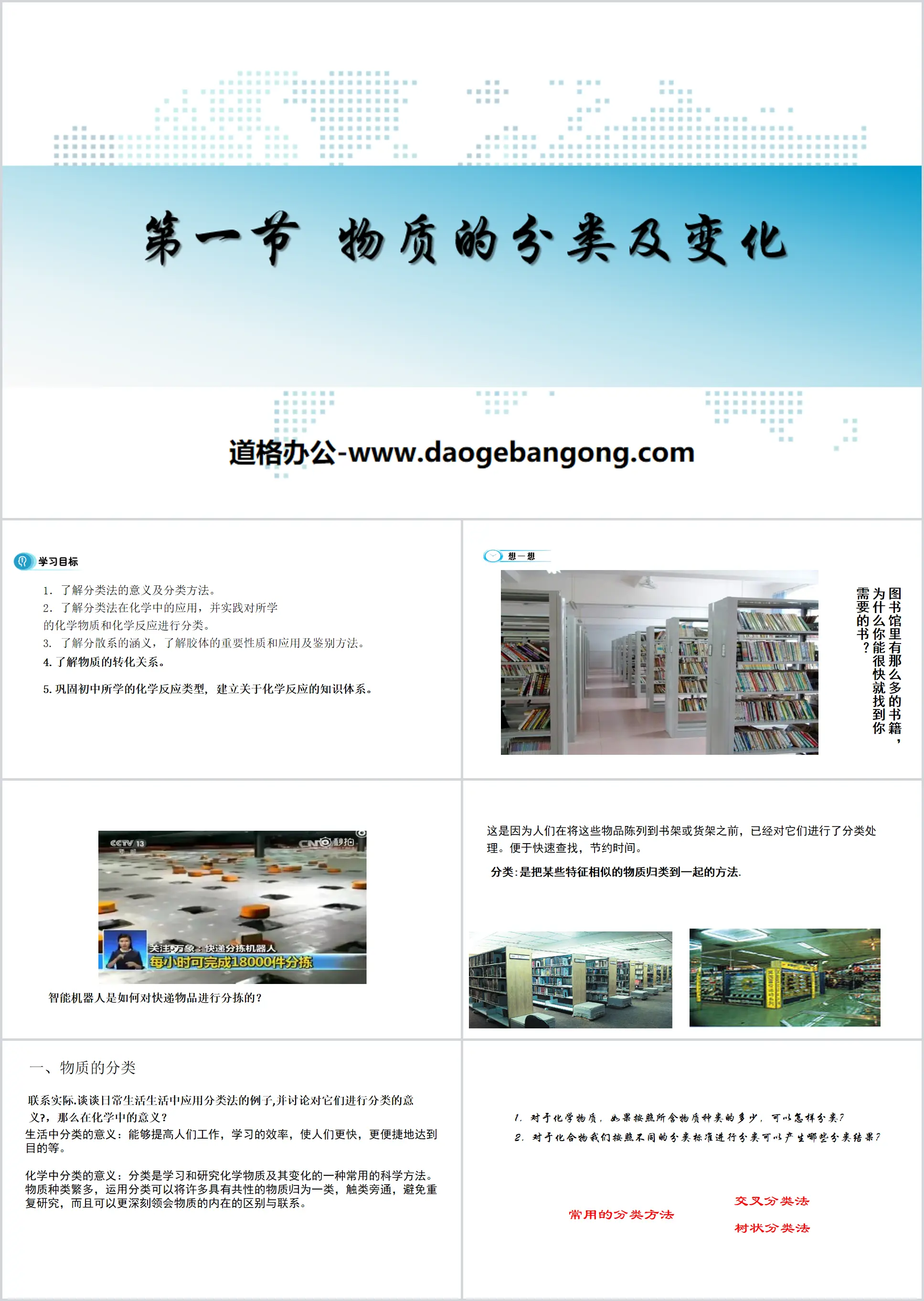
Related reading
For more detailed PPT-related tutorials and font tutorials, you can view:Please click to see





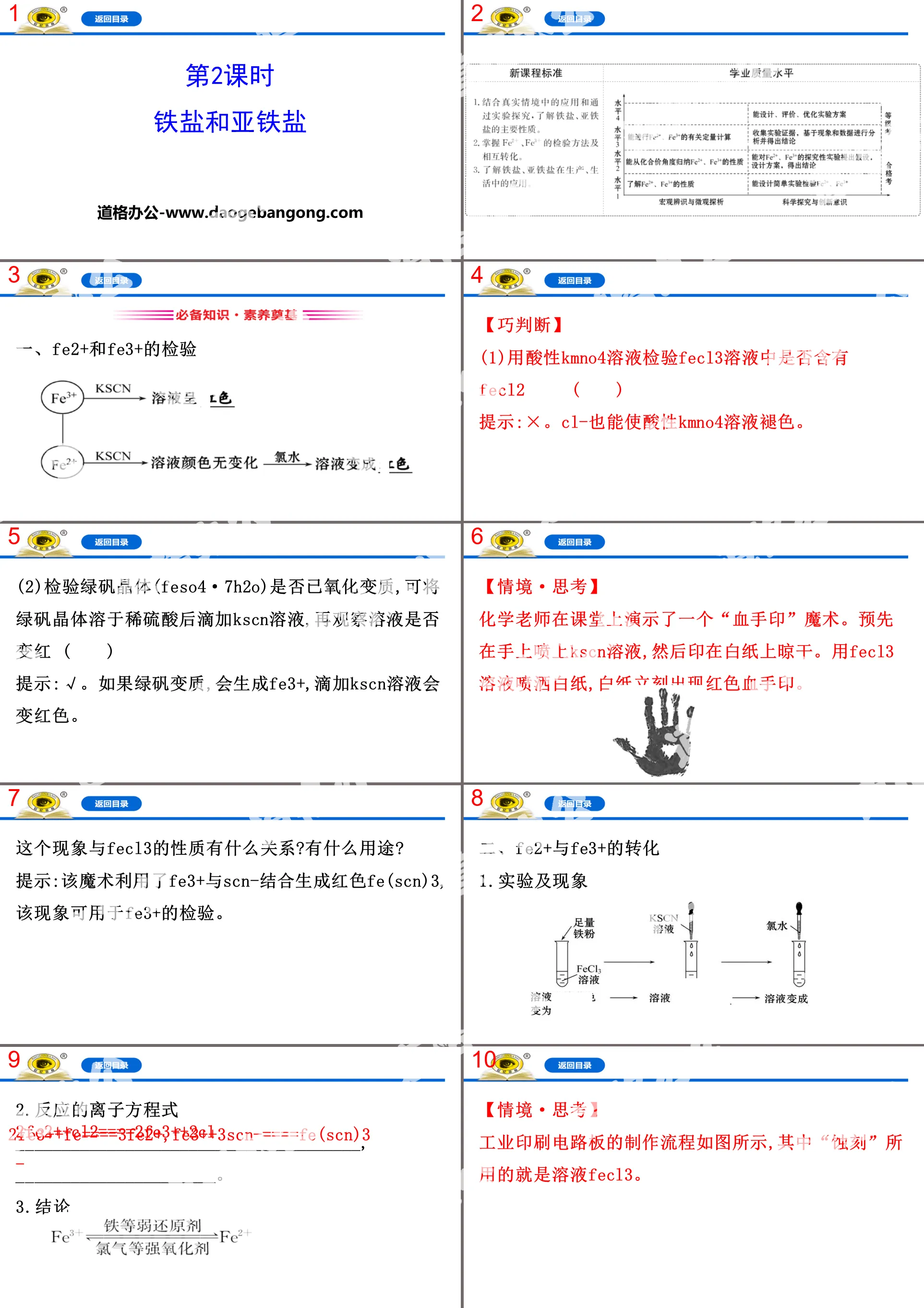
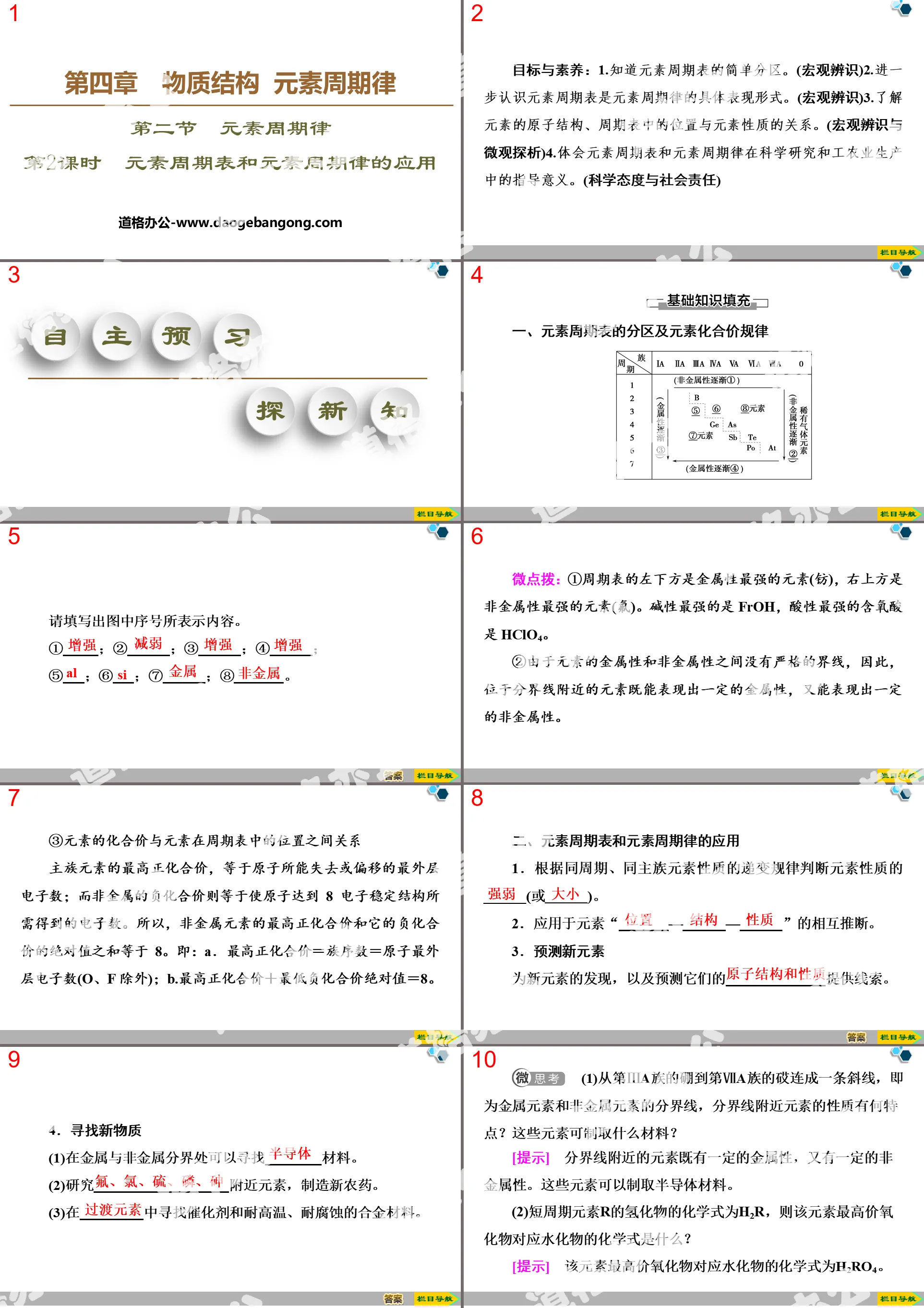
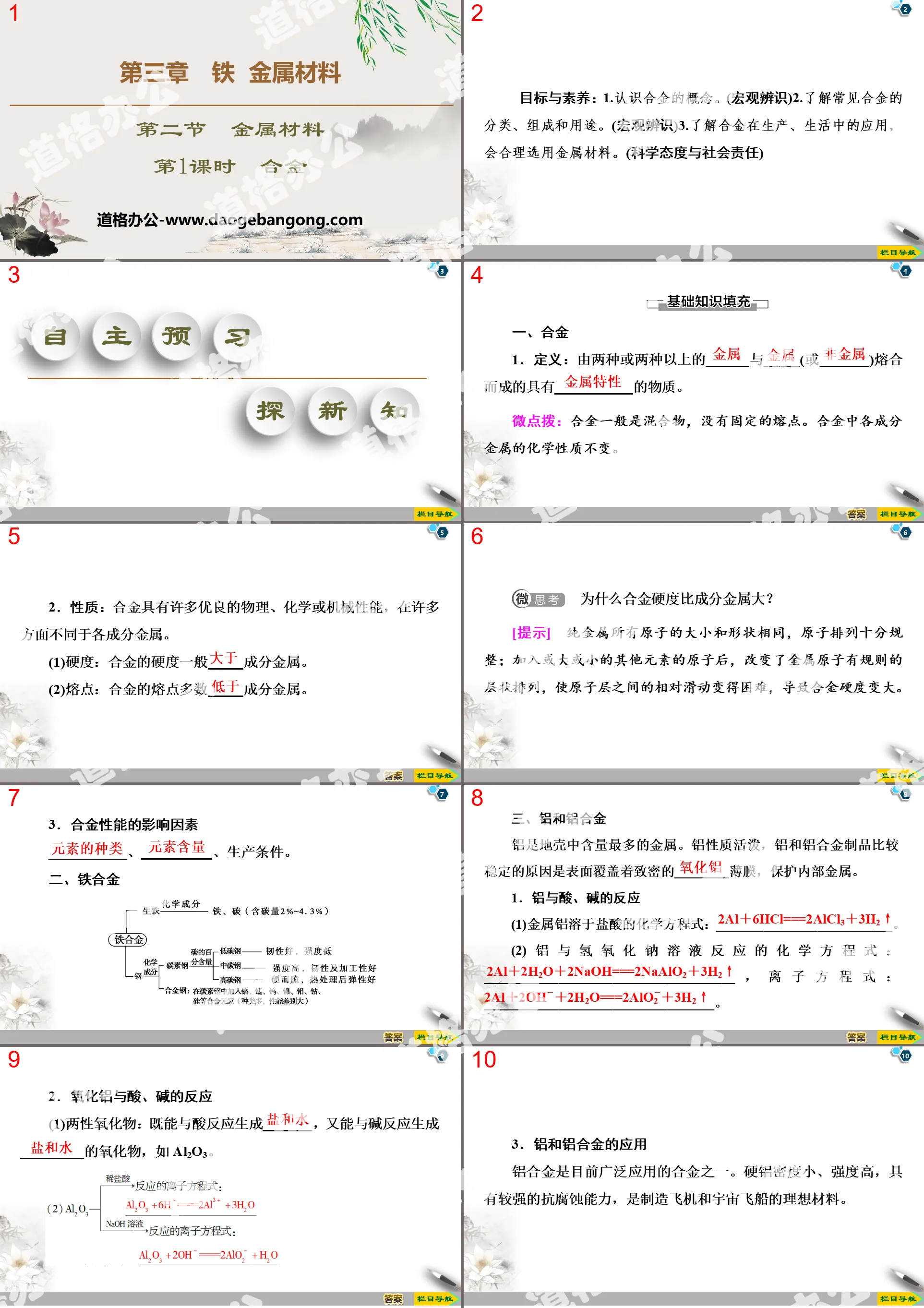

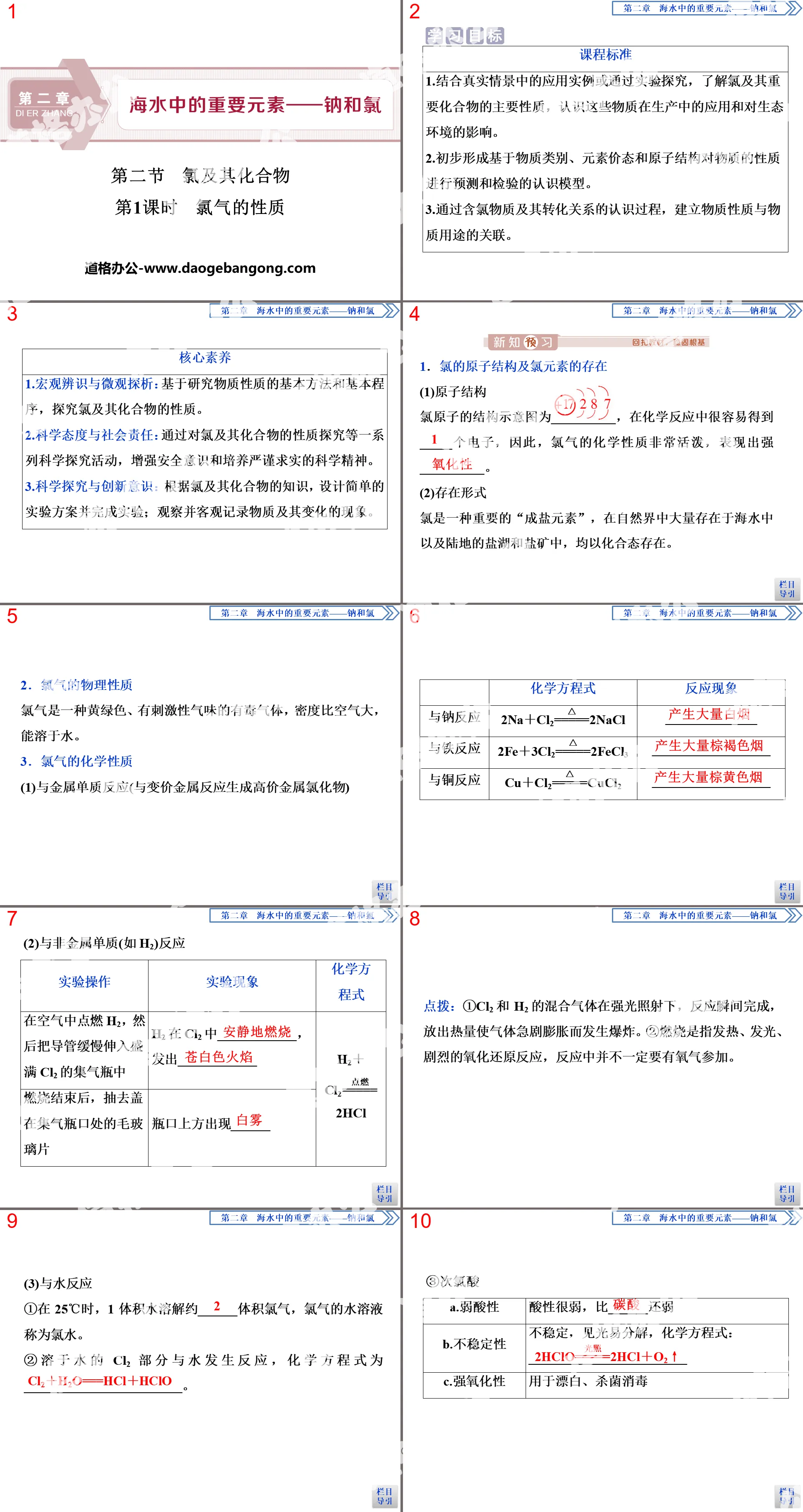
Authoritative PPT Summary
"Classification and Transformation of Matter" PPT courseware
Part One: Learning Objectives
1. Understand the meaning of classification and classification methods.
2. Understand the application of classification methods in chemistry, and practice classifying the chemical substances and chemical reactions you have learned.
3. Understand the meaning of dispersion system, and understand the important properties, applications and identification methods of colloids.
4. Understand the transformation relationship of substances.
5. Consolidate the types of chemical reactions learned in junior high school and establish a knowledge system about chemical reactions.
Classification and changes of substances PPT, part 2 content: 1. Classification of substances
Connect with practice. Talk about examples of applying classification methods in daily life, and discuss the significance of classifying them? What is the significance in chemistry?
The significance of classification in life: it can improve the efficiency of people's work and study, and enable people to achieve their goals faster and more conveniently.
The significance of classification in chemistry: Classification is a common scientific method for learning and studying chemical substances and their changes. There are many types of substances, and classification can be used to group many substances with common characteristics into one category, to avoid repeated research, and to gain a deeper understanding of the intrinsic differences and connections of substances.
1. For chemical substances, how can they be classified according to the number of types of substances they contain?
2. What classification results can be produced by classifying compounds according to different classification standards?
1. Cross classification.
A classification method that classifies ________ in many ways according to the classification criteria of ________. For example:
Na2CO3
Classified according to the cations it consists of, it belongs to sodium salt
Classified according to the anions in their composition, they belong to carbonate
Classified according to their solubility into soluble salts
2. Classification of chemical substances
(1) Cross classification method.
①Cross classification of salt:
Na2CO3
Na2SO4
BaCO3
BaSO4
(2) Tree classification method:
A method of further classifying similar things according to attributes, grading, and progression, with one classification standard for each level.
What is the difference between cross classification and tree classification?
(1) There is a cross-relationship between categories in the cross-classification method; for example, Na2SO4 and K2SO4 belong to sodium salts and potassium salts respectively, but they all belong to sulfates.
(2) There is a subordinate relationship between the substance categories in the tree classification method; for example, salts belong to compounds, and compounds belong to pure substances.
Cross classification: It is a method of classifying the same thing according to multiple standards. It can provide a more comprehensive understanding of things and can make up for the shortcomings of a single classification method.
Tree classification: It is a method of further classifying similar things according to their attributes. It can understand things more deeply and promote scientific development.
Classification and changes of substances PPT, part three content: 2. Colloids
Does anyone still remember the concept of "solution" learned in junior high school?
One or several substances are dispersed into another substance to form a uniform and stable mixture, which is called a solution.
Solvent: A substance that can dissolve other substances.
solute: substance that is dissolved
A system obtained by dispersing one (or more) substance in another (or more) substance: dispersion system
Dispersed substance: dispersoid
Plays the role of accommodating dispersions: dispersant
Dispersion systems and their classification
1. Concepts related to dispersion system, dispersoid and dispersant
Dispersion system: A system obtained by dispersing one (or more) substance in another (or more) substance.
Dispersoid: The substance that is dispersed.
Dispersant: plays the role of holding the dispersion.
Classification and changes of substances PPT, part 4 content: 3. Transformation of substances
The following common substances in the laboratory, with which substances they can react, write the equation of the reaction. And summarize the rules of the reaction.
Fe, O2, C, CO2, CaO, NaOH solution, H2SO4, CuSO4 solution, Na2CO3 solution
properties of salt
1. React with metals to form metals and salts
2. React with certain acids to form new salts and acids
3. React with certain bases to form new salts and bases
4. React with certain salts to generate two new salts
5. Conversion of normal salt and acid salt
How would you classify the following chemical reactions?
(1) Sulfur burns in oxygen
(2) Red phosphorus burns in oxygen
(3) Iron wire burns in oxygen
(4) Aluminum foil burns in oxygen
Three standards:
①Is it a chemical reaction?
②According to the characteristics of the reactants
③Is it an oxidation reaction?
Keywords: PPT courseware for high school chemistry compulsory course 1 from the People's Education Press is available for free download, Classification and Transformation of Substances PPT download, .PPT format;
For more information about the "Classification and Transformation of Substances" PPT courseware, please click on the "Classification and Transformation of Substances" ppt tag.
"Classification and Transformation of Substances" Substances and their Changes PPT (Transformation of Substances in Lesson 2):
"Classification and Transformation of Substances" Substances and their Changes PPT (Transformation of Substances in Lesson 2) Part One Content: Learning Objectives Course Standards 1. Understand the properties of acids, bases, and salts. 2. Recognize that similar substances have similar properties and that various substances can transform into each other under certain conditions..
"Classification and Transformation of Substances" Substances and their Changes PPT (Classification of Substances in Lesson 1):
"Classification and Transformation of Substances" Substances and their Changes PPT (Classification of Substances in Lesson 1) Part One Content: Learning Objectives Course Standards 1. Understand that elements can form different types of substances, and substances can be classified according to their composition and properties. . 2. Understand the points...
"Transformation of Matter" Classification and Transformation of Matter PPT download:
"Transformation of Matter" Classification and Transformation of Matter PPT Download Part One Content: Literacy Objective 1. By reviewing the reactions between acids, bases, salts and different types of substances, summarize the main chemical properties and reaction types of acids, bases, and salts, and cultivate Changing concepts and evidential reasoning abilities..